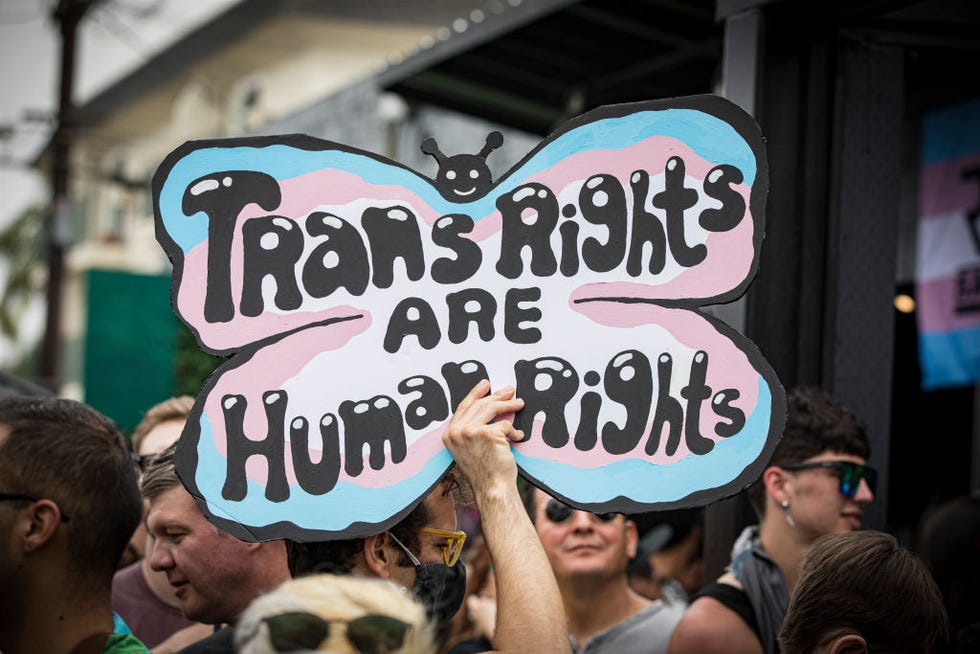Donald Trump has been reelected President of the United States, winning a close race against Democratic nominee Kamala Harris with 277 electoral votes. The 2024 election was pivotal for many reasons, from reproductive rights and abortion access on the ballot to LGBTQ+ rights and climate change. According to Cosmopolitan’s The Youth Vote survey, 23 percent of Gen Z voters care most about the economy while 10 percent list health care as a priority. Thirteen percent of those surveyed care most about reproductive rights, with more than 19 percent of women listing it as their biggest concern.
As nationwide election results continue to roll in, we’re breaking down how LGBTQ+ rights—including trans rights and gender-affirming care—fared in the 2024 election, and what those results means for the communities involved.
What do the 2024 election results mean for LGBTQ+ rights? What were the results where they were on the ballot?
Although the NBC News Exit Poll found that Harris led Trump 86 percent to 12 percent among LGBTQ+ voters, the election’s overall outcome resulted in Trump’s second term as president. How does that affect the community’s already existing rights?
Voters approved an amendment in New York’s state constitution that will continue to protect transgender and abortion rights in the Equal Rights Amendment (aka Proposition 1). Per the new language added to the already existing amendment, people cannot be denied civil rights because of their national origin, age, disability, sexual orientation, gender identity, gender expression, pregnancy, pregnancy outcomes, or “reproductive healthcare and autonomy.” (Before the update, the constitution only forbade discrimination based on race, creed, or religion.)
Same-sex marriage—which was legalized at the federal level in 2015—was also on the ballot in some states during the 2024 election. Voters in California approved Proposition 3, which amends the state constitution to recognize a “fundamental right to marry, regardless of sex or race.” Similarly, voters in Colorado approved Amendment J, which removed language defining marriage as a union between a man and a woman.
Does Trump’s election mean Project 2025 will pass?
Even with these victories, queer folks remain heavily concerned their rights are at stake under a second Trump Administration, especially given Project 2025. (While Trump has denied direct involvement with the $22 million effort and 900-page playbook, it was organized by the Heritage Foundation—including six of Trump’s former cabinet members, four people he nominated as ambassadors, and his first deputy chief of staff.) The transition document largely targets the LGBTQ+ community, which its organizers believe exists in opposition to the “traditional American family” and their Christian values.
Not only does Project 2025 prioritize families “comprised of a married mother, father, and their children,” but it would also remove federal policies that support equality and single parents (not just queer folks).
Per GLAAD, Project 2025 aims to:
- Eliminate LGBTQ+ rights;
- Eradicate federal funding for DEI programs;
- Purge the government of apolitical civil servants;
- Eliminate the checks and balances built into three branches of government in favor of expanded control by the executive branch;
- End reproductive freedom and replace the Department of Health and Human Services with the “Department of Life;”
- Replace the Department of Homeland Security with a 100,000-worker-strong immigration department, the militarization of the border, and an end to refugee programs; and
- Fundamentally alter American diplomacy in favor of anti-abortion and anti-LGBTQ+ agendas and abandoning international organizations and traditional diplomatic and security alliances.
Even though Trump’s former cabinet members were all heavily involved in the project, the president-elect has attempted to distance himself from the initiative as controversy around it grows. As of November 2024, it’s unclear whether Trump’s cabinet will move ahead with it.
What about trans folks and gender-affirming care on the 2024 ballot?
During his campaign trail, Trump said he plans on asking Congress to ban Medicare and Medicaid from covering gender-affirming care, as well as cut off federal funding to hospitals and clinics that continue to provide it. Under current Medicare and Medicaid regulations, patients’ rights are protected because hospitals can’t “discriminate against LGBTQ+ people or their families in visitation and in recognizing a patient’s designated decision-maker.”
Then there’s the Affordable Care Act (ACA), which Trump already attempted to repeal in October 2018. His Health and Human Services Department implemented a rule that changed how Section 1557 of the ACA is interpreted, leaving trans people out of the sex-based nondiscrimination protections as a result. President Joe Biden later rolled back the rule, which put protections back in place during his administration.
Rather than repealing the ACA or replacing it altogether, Trump’s VP-elect JD Vance told NOTUS that Americans are “certainly going to see efforts to reform the system.” This could potentially allow health care providers to turn away trans folks, who are currently protected under the Health Care Rights Law as part of the ACA.
According to the Advocates for Trans Equality, it’s illegal for most health care providers and insurance companies to discriminate against gender, race, national origin, age, and disability and to exclude transition-related care. Under the ACA, health providers are prohibited from turning someone away or refusing to treat them according to their gender identity.
Were any out LGBTQ+ folks elected during the 2024 election?
Yes! Several politicians who are advocating for LGBTQ+ rights—and are part of the community themselves—have made history by being elected during the 2024 election, including:
- Sarah McBride, United States Congress
- Julie Johnson, United States Congress
- Emily Randall, United States Congress
- Molly Cook, Texas State Senate
- Keturah Herron, Kentucky State Senate
- Rashaun Kemp, Georgia State legislature
- Gabby Salinas, Tennessee State legislature
- Aime Wichtendahl, Iowa State legislature
- Malcolm Kenyatta, Pennsylvania statewide official
For more information and resources on managing election-related stress, please visit mentalhealthishealth.us.
Sam is an assistant news editor at Cosmo, covering all things pop culture, entertainment, and celebrity news. She previously covered those same topics along with health, lifestyle, and beauty at Seventeen. When she isn’t catching a concert or live-tweeting awards shows, you can likely find her judging DJ sets at parties.
This post was originally published on here









